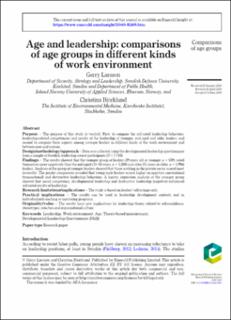Age and leadership: comparisons of age groups in different kinds of work environment
Peer reviewed, Journal article
Published version
Permanent lenke
https://hdl.handle.net/11250/2732056Utgivelsesdato
2020Metadata
Vis full innførselSamlinger
Sammendrag
Purpose – The purpose of this study is twofold. First, to compare the self-rated leadership behaviors, leadership-related competencies and results of the leadership of younger, mid-aged and older leaders; and second to compare these aspects among younger leaders in different kinds of the work environment and between men and women. Design/methodology/approach – Data was collected using the developmental leadership questionnaire from a sample of Swedish leadership course participants (N = 7,743). Findings – The results showed that the younger group of leaders (29 years old or younger n = 539), rated themselves more negatively than the mid-aged (30–50 years, n = 5,208) and older (51 years or older, n = 1,996) leaders. Analysis of the group of younger leaders showed that those working in the private sector scored most favorably. The gender comparison revealed that young male leaders scored higher on negative conventional (transactional) and destructive leadership behaviors. A logistic regression analysis of the younger group showed that social competence, developmental leadership and destructive leadership (negative) influenced self-rated results of leadership. Research limitations/implications – The study is based on leaders’ self-ratings only. Practical implications – The results can be used in leadership development contexts and in individualized coaching or mentoring programs. Originality/value – The results have new implications for leadership theory related to self-confidence, stereotypes, selection and organizational culture. Keywords Leadership, Work environment, Age, Theory-based measurement, Developmental Leadership Questionnaire (DLQ)

